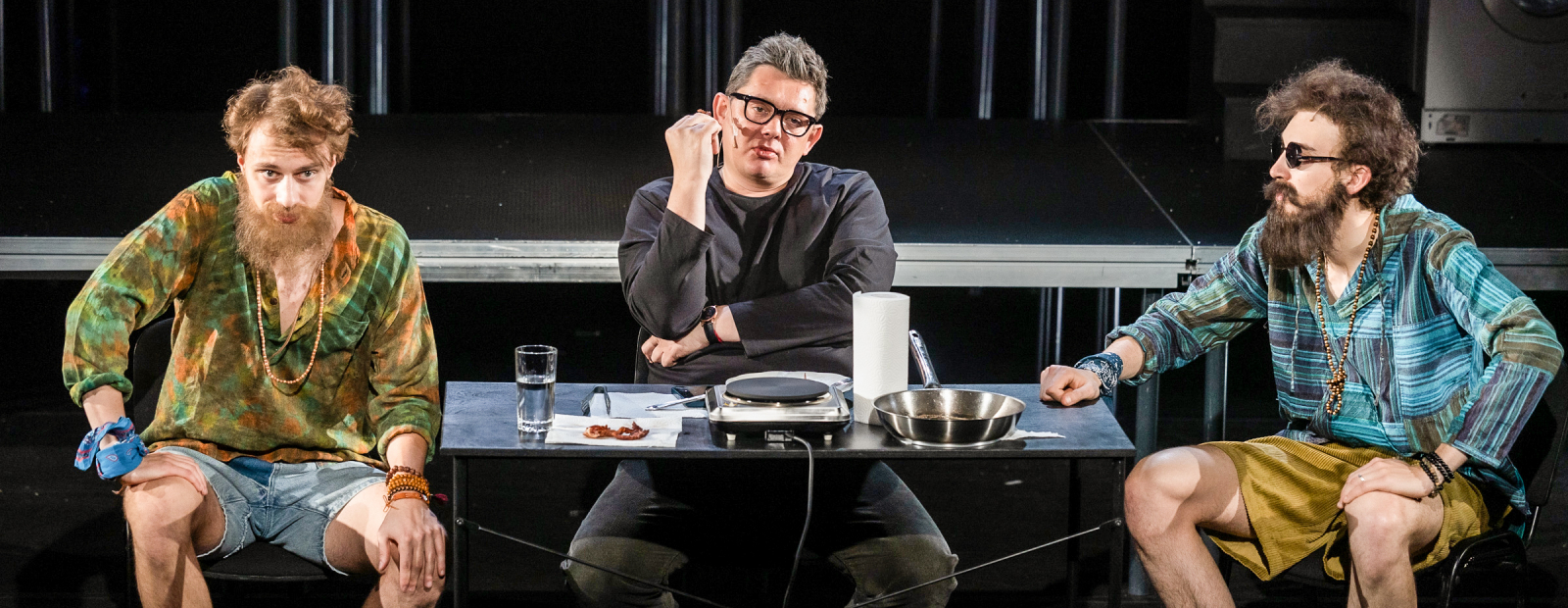The atypically high number of new productions, which makes the audience loyal to the New Riga Theater (JRT) whispers that now they come to the theater as if to work, at the same time it claims relevance and resonance in society. The comedies, mostly coming from the present day of German theaters and still in repertoire in their place of birth, are really those that reflect thematically on themes that could also interest contemporary Latvian society, but at the same time do not offer much more than visions. or funny conclusions that the viewer actually arrives at has already arrived at himself.
In the case of JRT, the saving grace is the fact that there are many talented actors in the troupe, although sometimes, looking at them, you get the feeling that the goldfish are being fed cat food in front of your eyes. However, in general, JRT has fallen prey to the missionary conscience of its artistic director, Alvjas Hermanis, and implements the program with puffy cheeks. In addition, the director regularly maintains his image as a leader of public opinion on social media, addressing both the publication of Kārļis Vērdins in the magazine Gazzetta del Teatro (the magazine itself is also hit) and against public television. But by the way Gazzetta del Teatro precisely in connection with JRT – and other performances – Zane Radzobe analyzes a question that arises in the analysis of the productions to be considered in the future, namely – whether staging quickly means staging well.
First of all about the future
Chronologically, the first JRT production of “Israeli director Yaela Ronen and actor Dimitriy Shaad, who emigrated from Kazakhstan” – as stated in the annotation – is the collaboration created under the direction of director Gat Shmit (R) evolutionthan in the Hamburg theater Talia premiered in February 2020. The show resonates to a large extent with Alvjas Hermanis’ exercises in the field of prediction of the future: performances The latest Beatles album, where humans confront their own programmed robot, e All under the skythat models the semi-automatic control over human actions against the backdrop of an imprecise imaginary China. (Revolution models a situation in which artificial intelligence completely controls human choices, from the conception of a child to the opening of the refrigerator. Unlike the performance in Hamburg, in which, judging by the images, visually expressive technological solutions were given free rein, in the Riga production the artist Krišjānis Elviks created a relatively modest play space, trying with costumes to show which characters have gladly approached the “wonderful new world” in which they themselves do not need to think, and yet which they more or less try to reject.
Artificial intelligence, played by Alecto Maria Linarte, conditions the lives of various characters and tries to direct it “correctly”. A Fuchs couple who want a child are faced with conditions that will actually deprive them of this child in the future, Dr. Frank and his spouse Ricky must obey Alecto’s advice to strengthen their relationship, while Tatiana Hoffmann’s life is deliberately broken by artificial intelligence in order to to find a body in which to incarnate. The ensemble of actors – Kristīne Krūze, Jānis Skutelis, Yevgēnijs Isajevs and Jana Čivžele – follows the rules of the game and balances in the coordinates of the tragicomedy. Kaspars Znotiņas manages to create a brighter character, whose rebel René Fuchs is funny, touching and very human in his efforts to rebel against the power of the machines. We will most likely see new colors when Gundars Āboliņš starts playing the role of Stefan Frank.
But the overall aftertaste of the one-act is subtle. Thematically, it’s another variation on a theme that doesn’t offer anything particularly new. Aesthetically, it is a work that at least gives the impression of not having been created with particular precautions, but with a relatively simple procedure. Worst of all, humanity can indeed fall under the control of technology, but then there is the question of what is gradually propelling us all towards such a future. The show does not aim to think in such categories. And the reference cited by the show’s writers and happily repeated by JRT to the book 21 Lectures for the 21st Century by popular author Yuvāls Noah Harari serves as a lure to entice the audience, but acts as an obstacle to the evaluation of the finished product – the specific production.
First Neanderthal
Exactly the same question – what’s behind it all – should be asked in relation to the other show under consideration here. Alvis Hermanis himself addressed the show by Jaela Ronen and Dimitrij Schaad, which premiered this year at the Gorky Theater in Berlin Operation Mindfuck staging. The dramaturgical structure of this work is also relatively simple and the characters do not claim to reveal a particularly vivid biography. Rather, they are types needed primarily for plot development. The show about the so-called troll factories and pseudo-leaders of society created by political technologists is very topical, but its problem is its inability to say anything new on this topic.
The only very clever move that works not only on the marketing level, but also on the quality of the show, is the involvement of guest actor Artus Kaimins. An actor who has entered politics and enjoyed what it means with his (well, even that of colleague Gobzem) charisma of dragging a whole galaxy of people into the Saeima before (and probably after) that no one knows and then make a mess, hopelessly deceiving the wishes and expectations of his target audience, he knows what the story is all about, even if the show doesn’t provide answers, who exactly are the people pulling the strings, what they represent and what they want to achieve. I am reminded of the interpretation of Artus Kaimiņš in the role of a cynic – a creator of public image – who creates a leader / hero from an emphatically monkey-like specimen of humanity (an older theatrical character created by Hermanis – a Pushkin similar to a monkey) is sober, focused and precise. However, the situation proposed by the playwrights distracts the viewer’s attention from who the real authors of such scenarios are, on the fact that an excessive search for the result can bring everything to a standstill and cause unforeseen consequences.
Similar to the recent production Žižek. Peterson. The duel of the century the director also experiences the arsenal of manipulations at his disposal. This time from the start, when he plays Chris de Burgh’s catchy song Lady in red, Lolita Stūrmane (Elvita Ragovska in another cast) takes the stage, irritably strips off her red clothes and puts them in one of the washing machines arranged in the shape of a pyramid, remaining in her red underwear – and leaves, leaving the laundry ” to be washed “, which actually means that during both acts the audience occasionally catches the red dot on the stage. Later, when Sandra Kļaviņas’s character, dressed in red, throws this laundry on stage, there are two options: either is meant a metaphor, which doesn’t make much sense, or there isn’t any metaphor, but Alvis Hermanis teases the public, making them think there is. If the director has seriously thought about the washing machine as a metaphor for brainwashing, one can only sigh in the spirit of Raina: “Wow, wow, my dears!”
Young actors Sabīne Tīkmane and Dāvids Pēterson would have benefited if they were allowed to act a little more alienated, with some distance, although it cannot be denied that Sabīne Tīkmane acts with one hundred percent dedication and Dāvids Pēterson transmits three. and a half his character’s thoughts play quite accurately and effectively with flying / flashing goblins. However, Ritvars Logins and Gerds Lapoška feel very comfortable in minor roles, which are covered in beards and resemble those who have recently retired. Red fish advertising images. It would be even more interesting if the past relationship between Sandra Kļaviņa and Artus Kaimiņas characters sketched in the plot had a broader development, but the show doesn’t deliver that.
I hope to be able to convince the JRT leader that the path he has taken towards the quantity of performances cannot be lasting and it would be valuable to think about projects of deeper depth, which would leave deeper traces in people’s consciousness and in the theatrical process (and in history, you know). Because if we talk about serious problems with a hasty intonation, they do not lead to the expected discussion, but only about how simplified JRT’s stage language has become.
(REVOLUTION
JRT 15., 16.XI at 18.30, 7.-9.XII at 19
Tickets Paradises tickets in the network EUR 15–30
OPERATION “MINDFUCK”
JRT 19., 20., 22.XI, 15. – 18.XII to 19
Tickets sold


